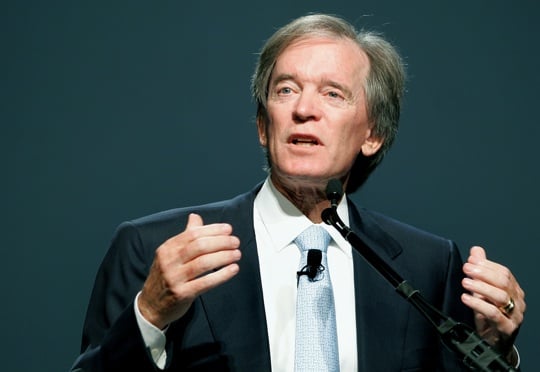After months spent criticizing puny interest rates on government paper, Pimco Total Return Fund boss boosts Treasury holdings
Bill Gross, who runs the world's biggest debt fund at Pacific Investment Management Co., increased holdings of Treasuries and bonds outside the U.S. last month while cutting money-market securities.
Gross boosted his $243 billion Total Return Fund's investment in U.S. government securities to 8 percent of assets in June from 5 percent in May, according to Newport Beach, California-based Pimco's website. Bonds in developed markets outside the U.S. rose to 13 percent of holdings from 10 percent. Cash and equivalents dropped to 29 percent from 35 percent.
The Federal Reserve will probably “extend the ‘extended period'” language in its policy statements, Gross said in an interview last month, referring to the central bank's pledge to keep borrowing costs low. “They will speak to a fed funds rate that persists for an extended period of time, which in effect caps interest rates.”
Pimco, which has been criticized for missing this year's rally in Treasuries, revised how it listed asset holdings last month to show that its flagship fund held U.S. government debt. Gross has said that U.S. yields are too low given the outlook for inflation.
Holdings in the category now classified as government-Treasury were previously known as government and government- related debt. The category of swaps and liquid rates added last month was unchanged at minus 9 percent. Mortgages held at 21 percent, while emerging-market holdings climbed to 11 percent from 10 percent.
Treasury Rally
Treasuries returned 3.56 percent this year, according to a Bank of America Merrill Lynch index.
U.S. government securities advanced yesterday as Moody's Investors Service cut Ireland's credit rating to junk status, adding to concern the European sovereign-debt crisis will spread and damp investor appetite for higher-risk assets.
The 10-year yield dropped as low as 2.81 percent, the least since December. Three-month bills, which are more sensitive to the Fed's target for overnight lending because of their short maturity, yield 0.02 percent.
The Fed has kept the target for its benchmark, the so- called federal funds rate, in a range of zero to 0.25 percent since 2008 to support the U.S. economy.
The Total Return Fund handed investors a 6.61 percent gain in the past year, beating 71 percent of its peers, according to data compiled by Bloomberg. The one-month return is 0.34 percent, outpacing 66 percent of its competitors.
Inflation Risk
Gross, the billionaire founder and co-chief investment officer of Pimco, has said for months that Treasuries are unattractive because yields don't offer enough compensation for the risk of inflation will hurt investors.
U.S. 10-year yields, the benchmark for consumer and company borrowing costs, were little changed at 2.89 percent as of 10:31 a.m. in Tokyo, according to Bloomberg Bond Trader prices.
After accounting for costs in the economy, the so-called real yield was negative 71 basis points.
The new government-Treasury category includes holdings of U.S. Treasury notes, bonds, futures and inflation-protected securities. The swaps and liquid rates sector includes U.S. dollar-denominated interest-rate swaps, swaptions, options, and other derivatives. A negative number in a category indicates a bet against U.S. government debt.
Derivatives are financial obligations whose value is derived from an underlying asset such as debt, stocks or commodities. Futures are agreements to buy or sell assets at a later specific price and date.
Pimco is a unit of Munich-based insurer Allianz SE. The company had $1.28 trillion under management as of March 31.
--Bloomberg News--







